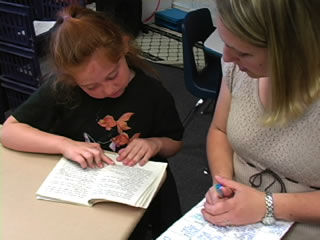Standards
In writers workshop, Noyce has given us the national standards,
and there are certain genre studies that we have to have published
for the portfolio, and that we turn in. For second grade, I need
to have them publish a narrative, a procedural piece, a functional
piece of writing, which can be like letter-writing, an informational
piece, and a response to literature. Noyce wants us to do that for
the portfolios that we submit to them at the end of the school year. We
also have three on-demand pieces of writing. This is
just for second grade.
Then we have the national standards, and the
national standards show each genre study. If they want to be
meeting grade-level standards, their narrative needs to have
a setting, characters, shows movement through time, they have
to use transitional words or phrases, all of those things must
be in place. My
mini-lessons are built all around those national standards.
I know a lot of people say, standards to them is kind of a “bad
word” almost. But for me, I’m able to do readers
and writers workshop, and be creative in my mini-lessons, and meet
all of the second grade standards, as well, embedded in there. That
is really what drives our instruction. But through the way,
we teach them how to be thinkers. It’s not like, we’re
giving them “drill and kill” worksheets (as we call them.)
Let’s say that one of the standards is “You need to
have a setting in your story.” For my student who maybe
is below grade level, maybe for them their setting consists of one
word—“the beach”—“I was at the beach”—in
their story. Or maybe, for my kid who’s above grade level,
in my conferencing I can move them into giving more specific details. I
struggled with this for a long time because I have a huge number
of second language learners in my classroom. And I came to
my principal and I said, “These standards are ridiculous for
kids who are just starting to learn our language!” and
it was then that she said, “But don’t you know that we
have the second language learner standards as well.” And I
didn’t know that. So there’s another set of standards:
they’re
very similar, but at the same time, depending on their SEP level,
if they’re right there, then I know, that’s
where I need to take them. If they need to be pushed, then I push
them. And that’s the beauty of the workshop, is I’m
able to push them, conference with them one on one, so not everyone
is.. even though we’re in a genre study, if I showed you the
different levels of writing they produce, it’s amazing. And
what’s on grade level for one, might not be for the other.
But that’s okay, because it’s what they can do.
When I look at the standards, I include
the national standards, the California standards, and then maybe
even our report card standards, and then I can plug
in a genre study that my team and I have created together based on
those standards. I don’t look at the standards and say, “Okay. Setting,
plunk, here.” That’s not the way it works. We created
these units, these genre studies, with an order. Sometimes, though,
we’ll
plan together and we’ll say, “Okay, we’re going
to be working on this this week, with five mini-lessons,” and
then the team will meet back together and we’ll say, “wow,
our kids did really not do well crafting a story, focusing in on
a small moment. They
really are struggling with that. So you know what, I need to spend
another day or two on that.” That’s what I
like about the workshop format. Because if you need a little
bit more time, it’s
really geared for the kids’ needs. So I’m not on
a particular page on a particular day, it’s “This
is where we are in the workshop right now, and they need to get here,
so and so’s struggling, he might need to spend another day
on it, and that’s okay.”
 Living
the Life of a Reader and Writer
Living
the Life of a Reader and Writer